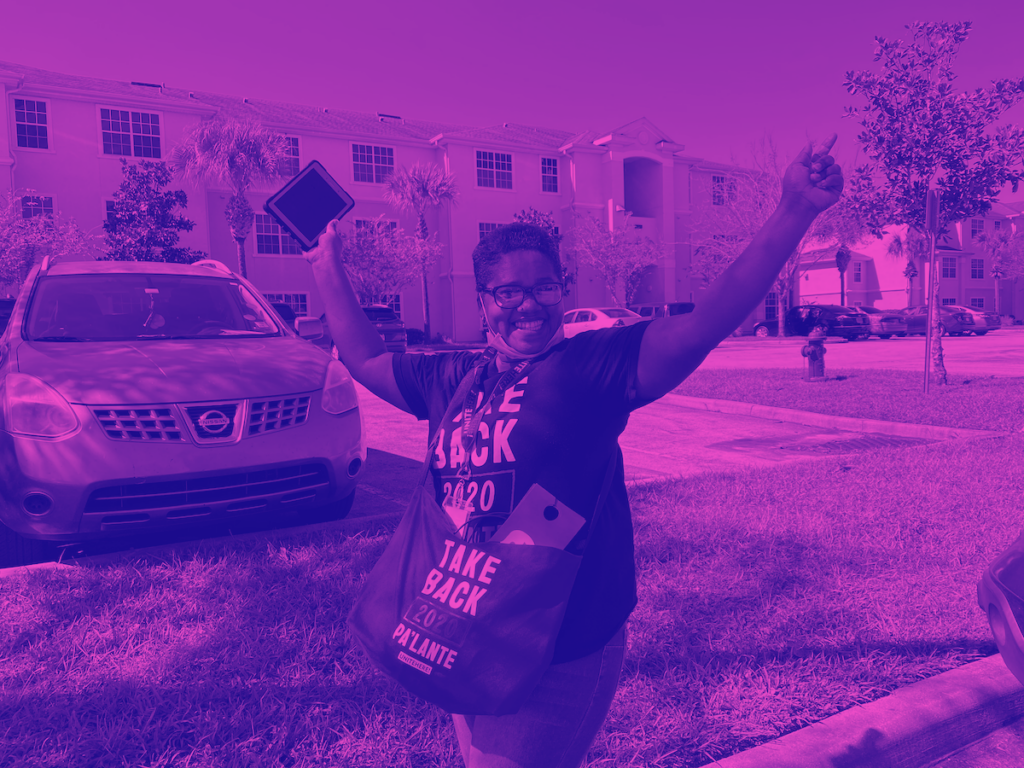In 2020 the hospitality workers’ union, UNITE HERE, ran the biggest on-the-ground campaign on the progressive side of politics. Power Concedes Nothing includes an interview with three people who were in the thick of this epic effort. Mario Yedidia was the Western Regional Political Director for the UNITE HERE International Union and is now the National Field Director. Stephanie Greenlea is assistant to the Secretary Treasurer of the UNITE HERE International Union, and a member of the union’s Black Leadership Group. Diana Valles was then the internal organizing director for Culinary Workers Union Local 226 in Las Vegas, Nevada; she’s now the Local 226 President, the local’s second-highest office. We caught up with them to ask for quick reflections on why they felt the book was important, and what lessons from 2020 they’re carrying with them into this election season.
“Being part of the 2020 effort was one of the most profound experiences of my life,” Stephanie Greenlea said. “In a moment of such intense and global rupture, with structures falling apart, and people being abandoned left and right with no net, over and over I saw people rise to the challenge, and do extraordinary things not just to improve their own lives but to build something better. That, and stories like it that are happening all over the place, need to be documented and told.
“Even when there is good news, it is on a service or altruism model, not so much about transformation and building and love—and that’s what the UNITE HERE story of the 2020 cycle and the Senate runoff is about… Deciding to get on the doors wasn’t only a strategic choice. It was rooted in the belief we have in our union that people deciding to do hard things together is transformational,” she said.
What did we learn?
For the UNITE HERE team, 2020 showed just how vital the field campaign is. “We have to be in the street and we have to be knocking doors,” Diana Valles said. “Nothing can replace the connection worker-to-worker, mother-to-mother, immigrant-to-immigrant. At the beginning we wondered how can we do this, with social distancing and all? Do we do a media campaign, or what? But there’s nothing that can replace connecting with people on a personal level.”
As remarkable as the 2020 work was, it won’t be enough going forward. “All told the union knocked more than four million doors, and we have to do more. To build power and win elections for the working class in the future it’s going to require more people than our union had in motion to defeat Trump—and more people than our whole movement had. If we’re going to win, we need to be bigger, and we need more people, among other things, doing that door-to-door work. It’s important for us not to lose sight of that in light of the future,” Mario Yedidia said.
Winning in this year’s midterms will also require understanding people’s lived realities and bringing clear politics to them. “We need to recruit a big army again, but people have a lot of issues,” Valles said. “Rent, gas, every week people have to pay 20 more dollars at the supermarket… We’re not saying ‘OK, we’re going to support this candidate, this party’. We just know that we have to fight for our issues, and that’s what people want to hear from politicians right now: What are we going to do?”
In 2020 the elections followed not long after the onset of the pandemic in the U.S. and the racial justice uprisings that followed the murder of George Floyd. “We’ve now lived under the reality of the pandemic, all of the economic fallout, all of the grief, the loss, the health tragedies, the anger, polarization for years now,” Greenlea said. “We’re going to need major activation energy to dig in for another round. But that’s all the more reason for the timeliness of this project and for having these conversations about what it will take to gear up the whole thing now as people are tired and have trauma. But as we do, we’ll find the same hopes, dreams, fears and challenges and reasons to try are there.”
From Power Concedes Nothing:
Diana Valles: We went through a lot, good and bad. My role was to canvass in the last weeks and it was a beautiful thing to see that you can connect with people because you’re talking to people like you. When you talk from your heart, you really can connect. If you find somebody from your country, for example, you can start talking to them. “Remember when we first got here? What were our dreams, why we got here in this in this country in the first place? They are trying to take that away from us.”
Even though they are afraid to open the door to you, when you start talking, they want to invite you into their house and we couldn’t do it, right? We were supposed to be talking at the door and observing social distancing and asking them to wear a mask. If they didn’t want to wear a mask, we couldn’t talk to them.
And before we used to be able to put people in our car and take them to vote. Not anymore. Now we have to organize them and trust them that they’re going to go and vote. And I personally have the experience of or one or two of them calling me after that, very happy. “OK, I did it. I just voted and it was only me, but I did it.” Everybody was receiving those calls.
Of course, you are also dealing with racism. You find people that are Trump voters and they treat you really, really bad when you go to those doors. Me, personally, I’m from Mexico, I’m Latina. I don’t speak a good English, but when I go there and they hear my accent they’re like, “We don’t speak Spanish here, is she speaking English?”
But the overall experience was really, really motivating. After going and knocking on doors and walking all day long, our canvassers were so energized at the end of the day.
Mario Yedidia: Just to add on to both of Diana and Stephanie’s points: How was it every day? It was historically hot, because working class communities of color are bearing the brunt of climate change and we felt that in Las Vegas every day. It was historically smoky in Reno, Nevada. The air quality was such that we weren’t supposed to be walking, and we lost a number of canvass days and switched to phone-banking because of the historic smoke in Northern Nevada from the fires in California.
The other thing that it was: people sharing their story on every door, so having the courage to put themselves out there. The core of our work is telling our stories to one another on the doors. In the case of Atlanta, you have 1,000 people doing that every day. Trying to do that on 50,000 doors.
And doing it! The other point is that we were talking to a historic amount of people.
The contact rate was 30% on the first pass. It’s never higher than 22% on a political canvass, but because of COVID, and because we were talking to working-class voters, especially in Nevada where the unemployment rate reached the highest in the country over the summer during the pandemic, people were home, and people were wanting in general to talk to us.
So, there’s all the hard, but there’s also an organizing culture. You’re talking to people who disagree with you every day, and you’re moving people to action. And so the platitudes about, “No, these voters don’t talk to us,” or “All Trump voters are like this”—you cut through that when you’re having a lot of actual organizing conversations every day.
Stephanie: We were on the doors in West Philadelphia when Walter Wallace Jr. was murdered by the police. Some of our canvassers heard the gunshots. Some of our canvassers had grown up in that neighborhood and were food service workers in Philadelphia who had come out to try to transform the vote in that city and with it the state and the country.
The canvass meetings after Walter was murdered were obviously, really, really, really, really hard. A lot of tears, a lot of things that had to be worked through, a lot of fear.
And people were saying, “Yep. I’m knocking for my life and if I’m not knocking for mine, I’m knocking for yours so we’re going.” And people went back out there.
And there was all this nervousness about whether the city was going to
explode that night. But people went back out on the doors and their commitment to staying on the doors and continuing to talk to other people about what was at stake and about what difference they could make in it—I’ll never forget it as long as I live, in that particular context of COVID, anti-Black violence and the economic suffering in Philadelphia, one of the poorest cities in the country.
We then decided to take a little more time off the doors, and we went to Love Park in Philadelphia and arranged a concert with our partners. It was in the middle of the night, and it was joyous and beautiful and again, a multiracial picture of workers. And the absolute best of what this country and our communities can be, right, on the eve of the struggle. I think that was October 26, just days before the election. And it was just such a hopeful thing that it got turned into, led by working people.
Featured image: UNITE HERE canvasser in Orlando, FL during the 2020 election. Photo courtesy of UNITE HERE.
Join us in person or via live-stream for the book launch at the People’s Forum on Thursday, April 14, 6:30 pm ET!
Did you enjoy this article?
We're in the middle of our annual fund drive, and this year we're building our own internal infrastructure for subscriptions, meaning more of every dollar pledged goes to fulfilling our mission. Subscribe today to support our work and be a part of Convergence's next evolution.

